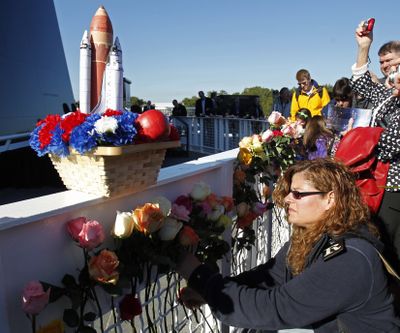Challenger disaster remembered

CAPE CANAVERAL, Fla. — Hundreds gathered at NASA’s launch site Friday to mark the 25th anniversary of the Challenger disaster, receiving words of hope from the widow of the space shuttle’s commander.
The chilly outdoor ceremony drew space agency managers, former astronauts, past and present launch directors, family and friends of the fallen crew — and schoolchildren who weren’t yet born when the space shuttle carrying a high school teacher from Concord, N.H., erupted in the sky.
The accident on Jan. 28, 1986 — just 73 seconds into flight — killed all seven on board, including schoolteacher Christa McAuliffe.
June Scobee Rodgers, the widow of Challenger’s commander, Dick Scobee, urged the crowd to “boldly look to the future” not only in space travel, but in space and science education. She was instrumental in establishing the Challenger Center for Space Science Education.
“The entire world knew how the Challenger crew died,” she said. “We wanted the world to know how they lived and for what they were risking their lives.”
Rodgers and NASA’s space operations chief, Bill Gerstenmaier, placed a memorial wreath of red, white and blue-tinted carnations at the base of the Space Mirror Memorial. The 42-foot-tall gleaming mirrored slab of granite bears the names of all 24 astronauts killed in the line of duty over the years — 17 of those in U.S. spacecraft.
Dennis and Pat Cassidy of Franklin, N.H., blinked back tears as Rodgers spoke. Pat Cassidy recalled the joy she felt when McAuliffe was named as NASA’s teacher in space — she screamed she was so excited. When Challenger was lost, she couldn’t stop crying.
“Geez. You never expected it to happen. We never expect these kinds of things to happen, I guess,” she said, clutching a red rose.
Her husband recalled after the initial shock, feeling so badly for McAuliffe’s family, all present at the launch: her husband, two children and her parents. “All I could do was say a prayer for the family. And that’s what they should do today, say a prayer for the families.”
The Cassidys, wintering in Florida, made a point to be at the ceremony.
So did Peggy Shecket, who traveled from Cleveland. Her dear friend Judith Resnik was aboard Challenger that freezing morning. The two women, back in the mid-1980s, lived such different lives. Shecket was a suburban Ohio mom with two sons. Resnik had become the second American woman in space. But their bond was strong: Resnik invited Shecket to the launch, and she went.
A photo she took an instant before the shuttle exploded hangs on her family room wall.
“I miss her terribly,” Shecket said. “At this age, in our 60s, we could have gone to ladies’ weekends together. She probably would have had time that she didn’t have 25 years ago because she was so busy.”
Kathryn Serene drove four hours from Savannah, Ga., in the wee hours of Friday to attend the 9 a.m. ceremony. She brought a homemade basket bearing a paper model space shuttle, red, white and blue silk flowers, and a large red apple, which she left at the base of the memorial. She was in middle school when the accident occurred, and wanted to show her respects all these years later.
Erik Volk hadn’t been born yet. Neither were his fellow fifth-graders from Espiritu Santo Catholic School in Safety Harbor, Fla., on the opposite coast. The 60 students were at an overnight space camp Thursday, and the chaperones rearranged the schedule once they learned of the ceremony.
“Remember the teacher? What I said about the teacher?” prompted his father, Joe Volk. “Yes. She was going to give classes from space,” said the boy, holding a yellow rose.
Erik, 10, said he was there “to remember the lives that were lost.”
The crew included commander Scobee; co-pilot Michael Smith; Ellison Onizuka, the first Asian-American in space; Resnik; Ronald McNair, the second African-American in space; McAuliffe; and Gregory Jarvis.
Erik waited patiently in a long line to place his long-stemmed rose in the white grated fence around the memorial. Each guest did the same following the ceremony, and the fence soon was adorned with flowers.
At the high school in Concord where McAuliffe taught, special assemblies were held Friday in her honor. Anniversary events also took place at Challenger Learning Centers across the country.
This silver anniversary comes as NASA is winding down the space shuttle program. The fleet will be retired after three more flights this year to the International Space Station.
Friday’s speakers stressed that exploration will never be risk-free. The Challenger astronauts demonstrated that painful truth — so did the lost crew of Columbia. But they also showed “that we can learn from our mistakes and be better for them in the end,” said Robert Cabana, a former shuttle commander who now is the Kennedy Space Center director.
“They continue to urge us forward, to explore and to never quit just because it’s hard,” Cabana said. “They are a part of us forever, and we will not let them down.”